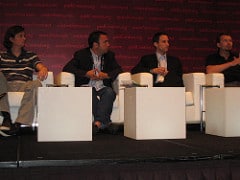 Shawn Gold, moderator for this session on scaling social media start-ups in to larger enterprises, kicked off with a challenge: “Hands up if your profitable”. Palms went up from half the panel – WordPress maker Automattic’s CEO Toni Schneider and SocialMedia Networks CEO Seth Goldstein. “Nice!,” said Gold. But how did these new companies do it so quick?
Shawn Gold, moderator for this session on scaling social media start-ups in to larger enterprises, kicked off with a challenge: “Hands up if your profitable”. Palms went up from half the panel – WordPress maker Automattic’s CEO Toni Schneider and SocialMedia Networks CEO Seth Goldstein. “Nice!,” said Gold. But how did these new companies do it so quick?
— A rolling start: Schneider, whose company had written the WordPress open-source software before launching a parallel commercial venture supporting blogs like New York Times’: “We were lucky in a way – we already had a lot of momentum (from the downloadable WordPress). We were able to come in and be immediately profitable offering services to large businesses, where they wanted a commercial entity to hold their hand a bit.” Maybe starting a company is a little easier when you have thousands of volunteer staff in timezones around the world – Schneider said thousands of people helped build the software but Auttomatic employs only 200.
Break.com co-founder Keith Richman: “Profitability is, at this point, a choice of how much we choose to invest in the business. The real investment is just new sales people. Each new sales person has a hard cost of $75,000 to $100,000, depending on how you use a recruiter. So when you grow yours sales organization from three to 15, you are making an investment in the company but it hurts your revenue.”
— Time to suck: Dalton Caldwell, CEO of ad-supported media streaming social network imeem certainly agrees growing gracefully is best: “The company made a lot of mistakes; we made several iterations of the product and we got it right two and a half years ago in terms of user experience.”
“It’s so hard to immediately start out successfully and in six months think you’ll have this big business. I had no idea but Pixar was around for 10 years, grinding away, (before it became successful). Having a lot of time to suck is an important part of the culture.”
And how does that philosophy map on the nuts and bolts of imeem’s business model? Caldwell: “We made a big bet and continue to make a big bet on licensed content with ad-supported streaming. It’s an infrastructure that we’re building that we think will be a lot more profitable for other companies.” Sounds like imeem has designs on becoming – whisper it – a platform, something in which there is clearly a lot of growth.
— Hiring and firing: How long before sucking doesn’t cut the mustard. Seth Goldstein, CEO of social media advertising platform SocialMedia Networks, suggested may have posters on the walls of his Silicon Valley offices reading “perfect is the enemy of the good”, but his own motto is: “Hire slow and fire fast.” “When you’re growing really quickly you invert it – because you have a lot of money, a lot of momentum, that B player (in your team) takes an A minus to a B plus. You’ve gotta get ’em out – its’ messy, painful and embarrassing and you’ve got to explain to your board why this person you were so excited about three months ago didn’t work out.” Ouch! And Goldstein also reckons one of his employees valued a personal email pat-on-the-back more than a raise. Amen.
— Mistakes: So let’s learn from these start-ups biggest errors. imeem’s Caldwell: “We used to ship client-side software that you had to download and install. Don’t do that. I learned that the hard way.” Break.com’s Richman avoided naming a specific mistake because “there are so many”. In Goldstein’s experience: “Hiring people who are underexperienced but who have a lot of hussle – those people typically get a lot more things done – it’s easy to overvalue experience. And for WordPress’ Schneider: “We make a ton of little mistakes every day – we built our organization around the idea of pushing out code and features every day – we break things and we fix them very quickly by having that kind of fragility.”